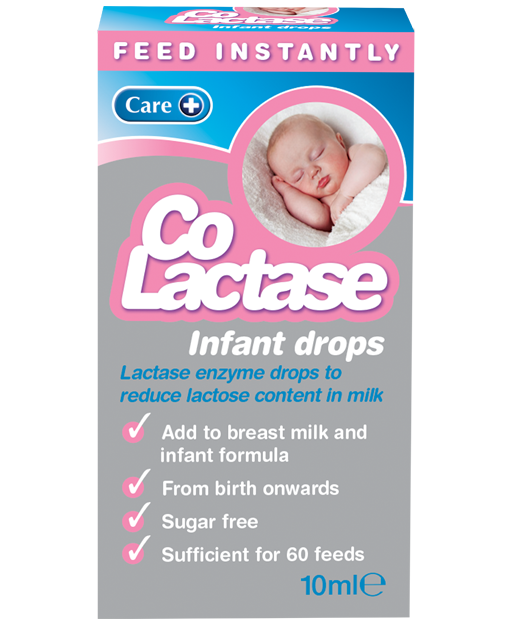What is Care Co-Lactase?
Care Co-Lactase Infant Drops are an enzyme preparation containing lactase and are designed to be added to a baby’s feed, (breast milk or infant formula), before feeding.
How does Care Co-Lactase work?
Lactase is an enzyme that breaks down lactose, the main sugar in milk (especially in breast milk).
Care Co-Lactase Infant Drops help to break down the lactose in your baby’s feed into more simple sugars which can be more easily digested by the body. Sometimes, young babies can struggle temporarily to create enough lactase on their own to digest the whole of their feed, therefore lactase drops such as Care Co-Lactase can help. The drops should not be given directly to a baby.
How are babies affected by undigested Lactose?
The immature digestive system of babies can have trouble breaking down lactose into more simple sugars. Doctors or pharmacists can tell you more about how this may affect babies.
Can Care Co-Lactase be used with comfort milk?
Yes, Care Co-Lactase Infant Drops can be used with comfort milk.
Comfort milk has much less lactose than normal formula milk, but if a baby is still having trouble digesting the lactose in it then Care Co-Lactase Infant Drops may help to break down the sugars even further. However, temporary lactase deficiency might not be the only cause of discomfort. If a baby still shows no improvement after trialling Care Co-Lactase for a week then you should recommend that the parents speak to their doctor or health visitor.
How long do I have to wait before feeding after adding Care Co-Lactase?
Babies can be fed straightaway with Care Co-Lactase as they contain a powder based lactase, as oppose to a liquid lactase enzyme.
The powder lactase has a stable pH which helps it to remain in the stomach where the lactose in milk can be broken down into more simple sugars. Liquid lactase drops aren’t pH stable and so the process of breaking down the lactose has to happen before the milk is consumed, which is why with some other colic remedies you have to wait 30 minutes before feeding.
What do Care-Co Lactase drops contain?
Care Co-Lactase Infant Drops contain lactase enzyme to reduce lactose content in milk.
Other colic preparations contain ingredients such as simethicone, an anti-foaming agent. Dill oil, to relax the tummy and Sodium Hydrogen Carbonate, to neutralise acid. These remedies won’t help with Transient Lactase Deficiency.
Are Care Co-Lactase Infant Drops similar to competitor products?
Yes, the only difference between the use of Care Co-Lactase and competitor products is that with Care Co-Lactase parents can feed instantly once added to breast milk or infant formula.
What about the use of lactose free formula?
Lactose free formula already contains lactase enzyme to break down lactose, which is the same effect which our infant drops have.
Can Care Co-Lactase be used with breast milk?
Yes, Care Co-Lactase works with both breast milk and infant formula.
Ensure you follow the manufacturer’s instructions on adding Care Co-Lactase to breast milk and make sure that it is fed to your baby before breastfeeding begins. Your doctor or health visitor can advise with any further queries.
Can Care Co-Lactase be used with anti-reflux milk?
Anti-reflux milk is usually designed to be of a thicker consistency than regular formula milk and breast milk.
Care Co-Lactase drops can still be added to this sort of milk, as they will help to break down any lactase the milk may contain.
What does it mean if my baby is showing signs of temporary lactase deficiency?
Temporary Lactase Deficiency is quite a common issue in young babies.
It occurs when the immature digestive system of the young child doesn't produce enough lactase to break down the lactose in milk. Lactase enzyme drops, like Care Co-Lactase, can help your baby digest the lactose until their digestive system is able to handle it. If symptoms persist, you should speak to a doctor.
Does this help with transitions to cow’s milk?
Care Co-Lactase Infant Drops are for the reduction of lactose content in breast milk and infant formula for babies 0 – 6 months who are showing symptoms of transient lactase deficiency (the immature digestive system of young babies can sometimes have trouble producing the enzyme lactase which breaks down the sugars in breast milk and infant formula to make them easier for your baby to digest).
Doctors or health visitors will be able to provide more information on transitioning a baby to cow’s milk.
From what age can I start using Care Co-Lactase for my baby?
Care Co-Lactase can be used from birth onwards.
It should only be used for as long as it takes for your baby to begin to produce enough of their own lactase enzyme as the gut develops – typically around 3-4 months. Further advice should be sought from your doctor or health visitor.
